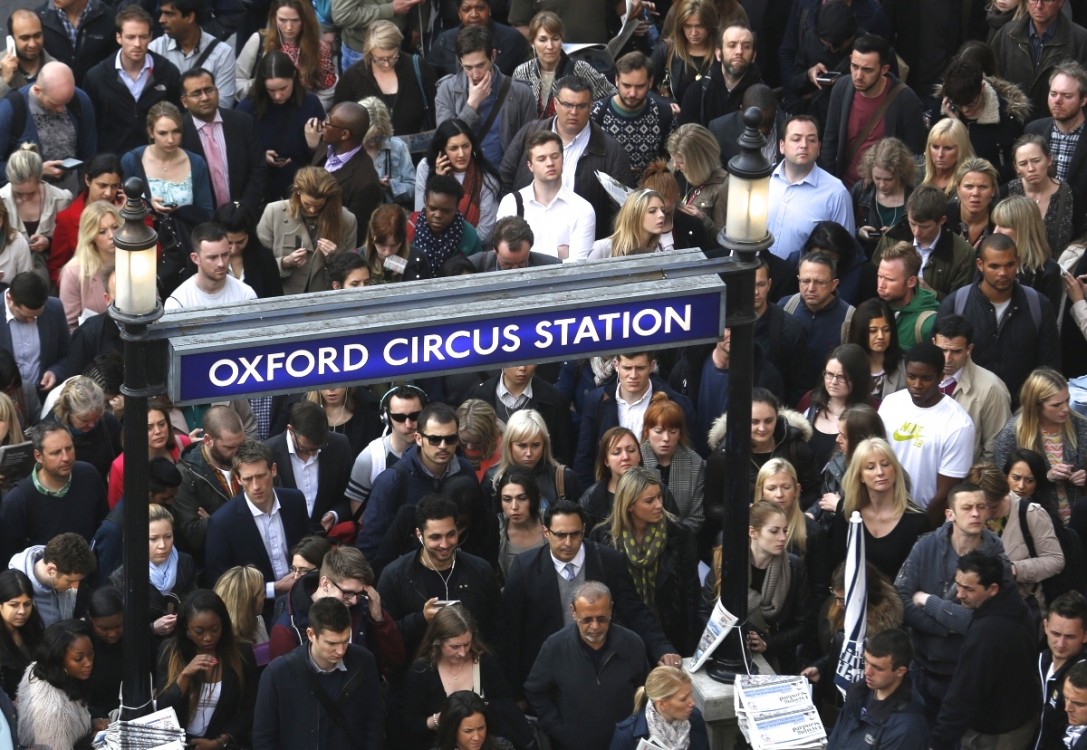
Last week's London tube strike resulted in some 4 million passengers stranded or facing delays, and last Thursday, the National Union of Rail, Maritime and Transport Workers (RMT) announced plans for a fresh, “escalated” round of staff strikes on tube train services in February. On Jan. 16, talks took place between London Underground and the RMT in an attempt to reach a compromise, but this is unlikely to happen as soon as many would like.
Strikers are protesting job losses that have led to a shortage of station staff, which they say is endangering passenger safety and reducing the level of customer service. Janine Booth, a night train station supervisor and prominent activist with the RMT, told Occupy.com, “Further action has to take place if we are going to successfully reverse the awful staffing cuts that have been imposed on tube stations."
“We didn't strike just to have a protest and let off steam. We did it so that the company – and above it, the mayor – would know that the current level of staffing is not sustainable and that we will not tolerate it. I think that the next strike will only be effective if it lasts for longer than 24 hours,” she said.
Responding to the wave of passenger complaints about the reduced service caused by strikes, Booth added, “Passengers will be better off if we win this dispute. They will have more staff on the stations, [who are] better able to help them, whether it is with day-to-day issues, ticketing, access or a safety incident. Some people may be disgruntled by the strike, but even more are disgruntled about the closure of ticket offices and removal of staff.”
According to RMT General Secretary Mick Cash, “It has now been shown that at management level there is agreement with the union that the cuts have been a disastrous mistake and that the staff need to be put back on the stations. We now need a move away from the piecemeal and incremental approach to tackling this crisis and for LU to come forward with a serious package of proposals."
He added, "With the constant overcrowding on stations and platforms it is only a matter of time before there is a major tragedy if we don’t act decisively. Our dispute is about taking action to haul back the cuts machine and put safety back at the top of the agenda. The union remains available for talks.”
While commuters hold out hopes that an agreement can be reached soon, others are less optimistic.
“The planned talks between the London Underground and the RMT will most likely be fruitless. London Underground shows no sympathy to the unions’ key demands” Craig Phelan, the editor of "Labor History" and a professor of modern history at London’s Kingston University, told Occupy.com.
Phelan is also concerned that the media’s focus has been on passengers, not tube staff, skewing public opinion. “Whenever there is a transport strike, the mainstream media has focused on inconvenience suffered by commuters,” he said, and "rarely is there coverage of how union members express their grievances, whether that be questions of pay, job loss, or commuter safety. In this way the strikers can easily be depicted as greedy and selfish, unconcerned with the suffering that they inflict on those who depend on transport to get to work or get their shopping done.”
However, Phelan celebrated what he sees as a rising tide of defiance on the part of workers, despite their negative depiction. “The great mass of British workers has been under the iron heel of austerity and job insecurity since 2008, and there are signs that the issue of workers’ rights is once again coming to the fore,” he added. “The rash of recent strikes and threatened strikes is a hopeful sign that the British public is slowly rousing from its slumber. Individual resignation in the face of budget cuts and job insecurity may just be turning into collective protest. The labour movement does not grow through incremental advancement. Rather, it tends to grow through momentous bursts of popular protest, when large numbers of people in diverse occupations demonstrate through industrial action that the status quo is intolerable.”
The right to strike in Britain will soon be curbed by the government’s 2016 Trade Union Act, which forces would-be strikers to investigate other means of making their voices heard. Bruce Carr, who was appointed by the British government in 2013 to lead investigations into the country’s strike action, told Occupy.com:
“The Trade Union Act 2016 hasn’t yet passed through parliament because the relevant provisions aren’t in force. But when it does, it’s going to make it more difficult for unions involved in industries which are important public services to take industrial action.
"There will be a requirement that at least 50 percent of the voting population of a union votes. If you’ve got 1,000 members, for instance, you’ve got to get at least 500 of them to vote before the ballot is valid, and if the strike is related to important public services, of which transport is one, then you’re going to have to have 40 percent of the union electorate voting in favor of strike action. So if your balloting constituency is 1,000 and 500 of those vote, you’re going to have to get 400 of them voting in favor of strike action before it’s valid,” he said.
Carr believes unions will resort to “leverage” tactics in order to bypass these tougher striking laws.
“They’re going to come up with other techniques to further their cause industrially,” he explained. “They might, for instance, put pressure on suppliers and say, ‘You shouldn’t be working with this employer because of its treatment of employees.’ The more difficult it is for a union lawfully to use strike action, the more likely it is that these employees will find other ways to progress their case.”
Seen in that light, this week's landmark talks could be a turning point not only for tube workers, but for the future of industrial protest in Britain. If the talks do not bear fruit – which at the moment seems the most likely outcome – what transport workers do next could become the ultimate test for the new anti-striking laws.
3 WAYS TO SHOW YOUR SUPPORT
- Log in to post comments












